Backgrounder
Behind the Rise and Fade of China’s Literary Sensation Fan Yusu
What’s behind the sudden rise and silent disappearance of China’s biggest literary sensation of 2017?
Published
7 years agoon
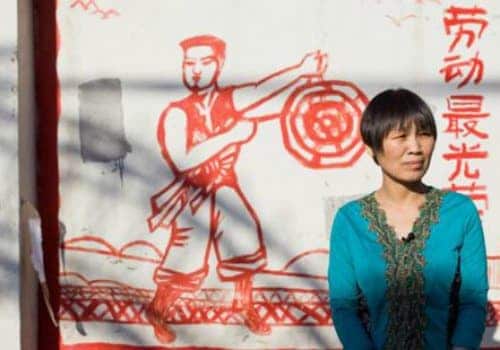
Beijing migrant worker Fan Yusu became an overnight sensation when her autobiographical essay “I Am Fan Yusu” went viral on Chinese social media in late April 2017. The author has since gone into hiding and her essay has been removed. What’s behind the sudden rise and silent disappearance of China’s biggest literary sensation of 2017?
Fan Yusu was the name on everybody’s WeChat in late April and early May of this year. An essay titled “I Am Fan Yusu” (“我是范雨素,” full translation here) spread like wildfire over Chinese social media, seemingly coming out of nowhere.
In some ways, the popularity of the essay in China is comparable to the recent hype over Alex Tizon’s essay “My Family’s Slave” on Western social media; this non-fiction story about ‘Lola’ Eudocia Tomas Pulido from the Philippines, who lived as a modern slave with an American family for 56 years, went viral on Twitter and Facebook in May. It gripped its many readers for exposing poignant problems in modern-day society that usually stay behind closed doors.
Fan Yusu’s account, in its own way, also revealed the harsh realities of an ever-changing society. China has an estimated 282 million rural migrant workers. The autobiographical tale focuses on the difficult childhood and adult life of one person amidst these 282 million – Fan Yusu herself.
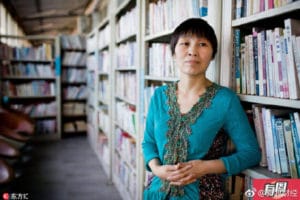
Fan Yusu on April 25, 2017. Photo by Sina Finance.
“I Am Fan Yusu” was first published on Noonstory.com, an online literary platform by Shanghai news outlet Jiemian. A year prior to its publication, one of their journalists (Dan Bao 淡豹) headed out to Picun for an interview. Picun is a migrant village on the outskirts of Beijing, not far from the capital’s airport. It was here that Jiemian learned about the local literary club and its many poems and essays. One of these works titled “My Brother’s Dream” particularly stood out to them. It was written by the 44-year-old Fan Yusu, and the editor soon decided to publish her first story (“农民大哥”) in May of 2016.
A year later, Jiemian published a second essay by Fan, not expecting that it was this piece that would soon hit three million views and go viral across the country.
HER STORY
“Am I living in the Qing dynasty or is this new socialist China?”
In “I Am Fan Yusu“, Fan recounts her impoverished childhood in a rural village in Xiangyang, Hebei. Fan came to Beijing at the age of 20. Being a clumsy waitress with low expectations for her future, she rushed into an unhappy marriage with an alcoholic husband and had two daughters. When her marriage turned violent, she returned to her hometown for help. It was here that she discovered she was “merely a passer-by” in the village where she was born and raised. Her brothers could, but were not willing to help; her mother wanted to, but could not help.
Being the youngest of five siblings, Fan already learned at a young age that men have the final say in China’s countryside. Although her mother was a powerful local politician for more than forty years, she resigned from her official post the moment Fan’s oldest brother objected to his mother’s work.
The twenty-something Fan then returned to Beijing and took on a job as a nanny in a rich family, leaving her own two daughters behind in the village of Picun, where many other children grow up without a mother. She writes about life as a babysitter for the child of her boss’s mistress, while his dressed-up young wife waits on the sofa every night for her husband’s return: “I wondered if I was living in the Qing dynasty or if this was new socialist China.”
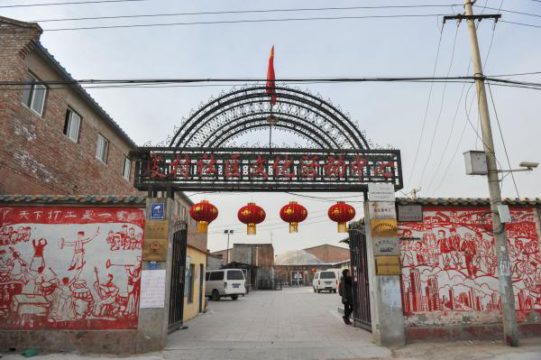
Gate at village of Picun, Beijing.
Despite her low educational background, Fan always had a thirst for knowledge and became a well-read person with a love for writing and literature. “If a person cannot feel happiness or satisfaction in life,” she writes: “they simply aren’t reading enough novels.”
ONE VOICE OUT OF MILLIONS
“We are all Fan Yusu.”
Thousands of netizens shared Fan’s essay shortly after it was published online. They responded to it with praise, saying it was a “unique piece of work” and even “Nobel-Prize worthy.” Why did specifically this essay become so hyped on Chinese social media?
The answer can be found in both the person of Fan Yusu herself as in her essay. The piece appealed to people because it uses simple yet powerful language. Some called it “unpolished”; a reflection of Fan’s own life and society at large.
The fact that Fan Yusu is in her forties, a single mother of two, and a migrant worker who has had a difficult life, makes her story carry more weight. She represents a voice that is generally lost in a media environment that is dominated by the middle class.
The popularity of this account also shows that a migrant worker with a low educational status can still be a successful writer. At a 2015 social gathering, Fan already mentioned that “‘migrant worker’ is not a derogatory term, just as ‘artist’ is not an elite one.”
“I Am Fan Yusu” also touches upon numerous issues such as domestic violence, divorce, gender inequality, the poor and rich divide, and a lacking healthcare system. These being issues that a lot of people have to deal with, the catchphrase “We are all Fan Yusu” (“我们都是范雨素”) soon made its rounds on WeChat and Weibo.
A NEW LITERARY MOVEMENT?
“Many in China’s elite literary circles do not touch upon society’s pain points the way Fan does.”
Fan Yusu’s account comes at a time when there is a surge of stories that tell the individual stories of ordinary people. An essay on Beijing’s crazy housing market titled “Housing Madness” (“房疯”) by an author named Chongzi (虫子) also saw its fair share of success in April of this year.
There is a growing appetite for these types of stories, and non-fiction websites such as Noonstory or Guyu Story provide a platform for them.
The popularity of such stories seems to relate to a growing weariness with established literature. On Weibo, many people shared their overall discontent with China’s literary circles in response to Fan’s essay. Many said they think of Chinese literature as being elitist and out of touch with ‘real life.’
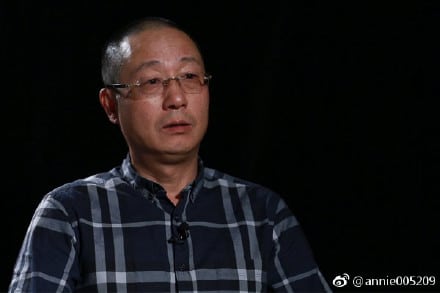
Renowned author Zheng Shiping (Yefu) praised Fan’s writings in a recent interview.
This idea was backed by renowned novelist Zheng Shiping (a.k.a. Yefu 野夫), who applauded Fan’s writing in an interview in May. He criticized Chinese modern literature, saying that many in those “elite circles” never touch upon society’s pain points in the way Fan does.
Some Weibo netizens responded with sarcasm, saying: “Literature is literature. No matter if it touches upon society’s pain points or not, it always needs to follow the ideology of the Propaganda Department.”
ROOTLESS WOMEN OF CHINA
“A married daughter is like water that has been poured.”
Another major factor that has contributed to Fan’s sudden success, is that her account shows the disadvantaged position of women in China’s countryside. Rural women are often caught in a vulnerable position, facing various economic and social obstacles that hinder their emancipation.
“A married daughter is like water that has been poured,” is a saying about countryside women who go out to marry. They often leave the house empty-handed. Fan addresses this ‘floating life’ of rural women in her essay. Women from the countryside are ‘rootless’ because their status, location, and economic rights change depending on the role they have as daughter, bride, wife, daughter-in-law, or mother. All land ownership is generally in name of the fathers, husbands, and sons (Also see this article on China’s ‘rootless women’).
When a woman marries outside her hukou (household registration permit), she usually has to give up any benefits or rightful land ownership she had in her previous household. No matter if a woman gets married into a different household or joins China’s mass urbanization, she often is bound to end up in the lowest layers of society.
WHAT HAPPENED TO FAN YUSU?
“Why is Fan Yusu censored?”
Only three days after Fan Yusu’s essay went online and viral, the text disappeared from its original source [editor’s note: the essay is still available on some websites]. Different Chinese media reported that Fan Yusu, overwhelmed by the media’s attention, had gone into hiding in a mountainous village.
It was not just Fan’s essay, but also its reviews that were soon “harmonized” (被和谐, meaning ‘censored’). One popular Weibo blog titled “Why I Like Fan Yusu” was no longer accessible as of May 6 for “violating the rules” on Weibo. The sudden disappearance of the essay and its direct reviews also made many netizens wonder: “Why is Fan Yusu censored? (范雨素怎么被和谐了?)”
Although the real reasons are not exposed, there is ample speculation. In her account, Fan writes about her problems with social anxiety. The sudden attention for her personal life may have been so overwhelming that some suggested it is Fan herself who wanted her essay removed. Especially since there were also journalists who went to her Hebei hometown to interview her mother – something that she dreaded. “I’ve run into a sandstorm,” Fan Yusu reportedly told her friend about the flock of journalists swarming into her village.
But there were also those who said that reasons for censorship perhaps related to the fact that the account revealed details about the personal life of her former boss, a rich and powerful man who may have put a halt to online publications.
Another plausible option is that the publication was removed due to its criticism on Chinese society and politics. “Sharp criticism is just not allowed,” some people commented: “She is very realistic, and exposes some gloomy aspects [of society].” Although Chinese state media initially lauded Fan’s essay, it is possible that the hype surrounding it just grew too big too fast.
The sudden rise and disappearance of Fan Yusu has some resemblance to the hype surrounding Chai Jing and her documentary “Under the Dome” in 2015. This self-funded documentary on China’s pollution problem originally was supported by Chinese state media. It received over 200 million views before it was abruptly removed from Chinese websites a week after its release.
At the time, Greenpeace East Asia’s Calvin Quek told Bloomberg that it might had to do with the timing, just before the start of China’s plenary sessions: “It’s a reflection of some kind of political infighting that they chose to shut it down. The government censored the film because it got 200 million views, and they did not want it to dominate the twin conferences,” he said.
In Fan’s case, the hype came just before the Beijing One Belt, One Road Summit, a very significant event during and around which Chinese media emphasized the idea of China as a responsible and harmonious global leader.
Although Fan Yusu’s ‘sandstorm’ has gradually blown over by now, she still has not returned to her Picun home according to the latest media reports. Fan might have disappeared from the limelight for now, she is not forgotten.
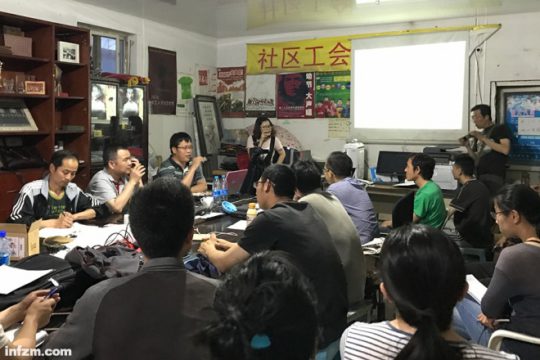
Worker’s culture home in Picun (by Southern Weekend / 南方周末).
Fan Yusu is the voice of a social class often ignored; she is a shining example that migrant workers can influence and shape the world of Chinese literature today. The heightened media attention for “the writers of Picun” (article in Chinese) is just one manifestation of how Fan Yusu has already made her mark – an unerasable one.
– By Manya Koetse
Follow @WhatsOnWeibo
©2017 Whatsonweibo. All rights reserved. Do not reproduce our content without permission – you can contact us at info@whatsonweibo.com.
Manya Koetse is the founder and editor-in-chief of whatsonweibo.com. She is a writer, public speaker, and researcher (Sinologist, MPhil) on social trends, digital developments, and new media in an ever-changing China, with a focus on Chinese society, pop culture, and gender issues. She shares her love for hotpot on hotpotambassador.com. Contact at manya@whatsonweibo.com, or follow on Twitter.

Backgrounder
“Oppenheimer” in China: Highlighting the Story of Qian Xuesen
Qian Xuesen is a renowned Chinese scientist whose life shares remarkable parallels with Oppenheimer’s.
Published
10 months agoon
September 16, 2023By
Zilan Qian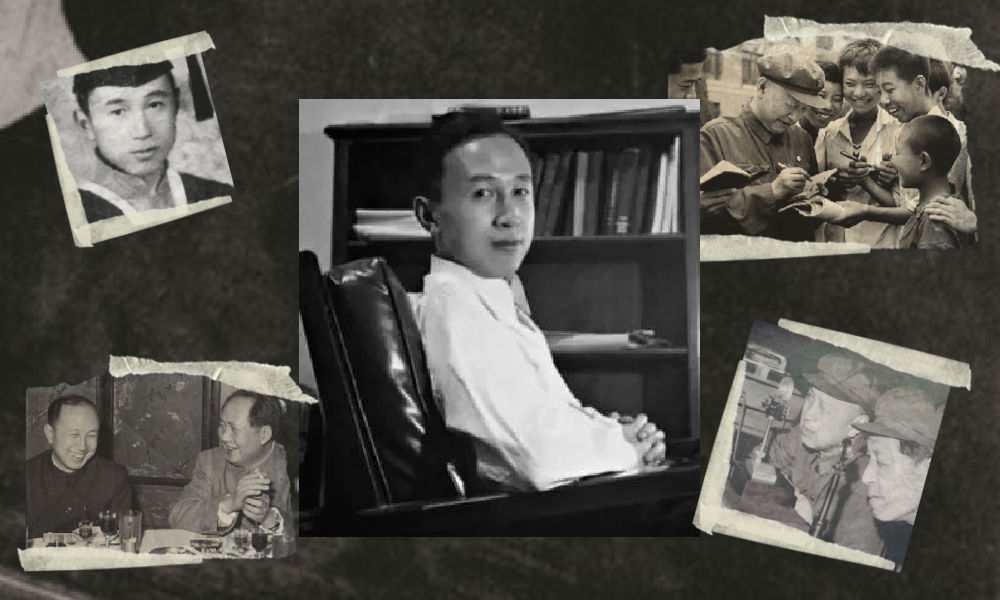
They shared the same campus, lived in the same era, and both played pivotal roles in shaping modern history while navigating the intricate interplay between science and politics. With the release of the “Oppenheimer” movie in China, the renowned Chinese scientist Qian Xuesen is being compared to the American J. Robert Oppenheimer.
In late August, the highly anticipated U.S. movie Oppenheimer finally premiered in China, shedding light on the life of the famous American theoretical physicist J. Robert Oppenheimer (1904-1967).
Besides igniting discussions about the life of this prominent scientist, the film has also reignited domestic media and public interest in Chinese scientists connected to Oppenheimer and nuclear physics.
There is one Chinese scientist whose life shares remarkable parallels with Oppenheimer’s. This is aerospace engineer and cyberneticist Qian Xuesen (钱学森, 1911-2009). Like Oppenheimer, he pursued his postgraduate studies overseas, taught at Caltech, and played a pivotal role during World War II for the US.
Qian Xuesen is so widely recognized in China that whenever I introduce myself there, I often clarify my last name by saying, “it’s the same Qian as Qian Xuesen’s,” to ensure that people get my name.
Some Chinese blogs recently compared the academic paths and scholarly contributions of the two scientists, while others highlighted the similarities in their political challenges, including the revocation of their security clearances.
The era of McCarthyism in the United States cast a shadow over Qian’s career, and, similar to Oppenheimer, he was branded as a “communist suspect.” Eventually, these political pressures forced him to return to China.
Although Qian’s return to China made his later life different from Oppenheimer’s, both scientists lived their lives navigating the complex dynamics between science and politics. Here, we provide a brief overview of the life and accomplishments of Qian Xuesen.
Departing: Going to America
Qian Xuesen (钱学森, also written as Hsue-Shen Tsien), often referred to as the “father of China’s missile and space program,” was born in Shanghai in 1911,1 a pivotal year marked by a historic revolution that brought an end to the imperial dynasty and gave rise to the Republic of China.
Much like Oppenheimer, who pursued further studies at Cambridge after completing his undergraduate education, Qian embarked on a journey to the United States following his bachelor’s studies at National Chiao Tung University (now Shanghai Jiao Tong University). He spent a year at Tsinghua University in preparation for his departure.
The year was 1935, during the eighth year of the Chinese Civil War and the fourth year of Japan’s invasion of China, setting the backdrop for his academic pursuits in a turbulent era.
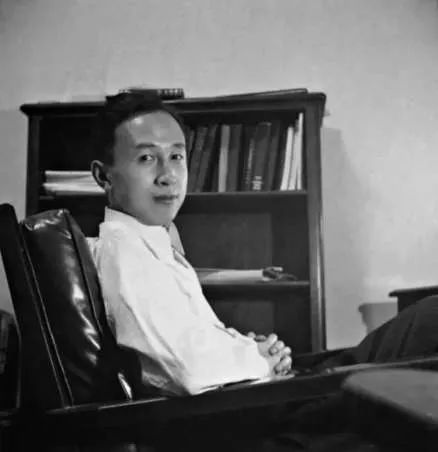
Qian in his office at Caltech (image source).
One year after arriving in the U.S., Qian earned his master’s degree in aeronautical engineering from the Massachusetts Institute of Technology (MIT). Three years later, in 1939, the 27-year-old Qian Xuesen completed his PhD at the California Institute of Technology (Caltech), the very institution where Oppenheimer had been welcomed in 1927. In 1943, Qian solidified his position in academia as an associate professor at Caltech. While at Caltech, Qian helped found NASA’s Jet Propulsion Laboratory.
When World War II began, while Oppenheimer was overseeing the Manhattan Project’s efforts to assist the U.S. in developing the atomic bomb, Qian actively supported the U.S. government. He served on the U.S. government’s Scientific Advisory Board and attained the rank of lieutenant colonel.

The first meeting of the US Department of the Air Force Scientific Advisory Board in 1946. The predecessor, the Scientific Advisory Group, was founded in 1944 to evaluate the aeronautical programs and facilities of the Axis powers of World War II. Qian can be seen standing in the back, the second on the left (image source).
After the war, Qian went to teach at MIT and returned to Caltech as a full-time professor in 1949. During that same year, Mao Zedong proclaimed the establishment of the People’s Republic of China (PRC). Just one year later, the newly-formed nation became involved in the Korean War, and China fought a bloody battle against the United States.
Red Scare: Being Labeled as a Communist
Robert Oppenheimer and Qian Xuesen both had an interest in Communism even prior to World War II, attending communist gatherings and showing sympathy towards the Communist cause.
Qian and Oppenheimer may have briefly met each other through their shared involvement in communist activities. During his time at Caltech, Qian secretly attended meetings with Frank Oppenheimer, the brother of J. Robert Oppenheimer (Monk 2013).
However, it was only after the war that their political leanings became a focal point for the FBI.
Just as the FBI accused Oppenheimer of being an agent of the Soviet Union, they quickly labeled Qian as a subversive communist, largely due to his Chinese heritage. While the government did not succeed in proving that Qian had communist ties with China during that period, they did ultimately succeed in portraying Qian as a communist affiliated with China a decade later.
During the transition from the 1940s to the 1950s, the Cold War was underway, and the anti-communist witch-hunts associated with the McCarthy era started to intensify (BBC 2020).
In 1950, the Korean War erupted, with the People’s Republic of China (PRC) joining North Korea in the conflict against South Korea, which received support from the United States. It was during this tumultuous period that the FBI officially accused Qian of communist sympathies in 1950, leading to the revocation of his security clearance despite objections from Qian’s colleagues. Four years later, in 1954, Robert Oppenheimer went through a similar process.
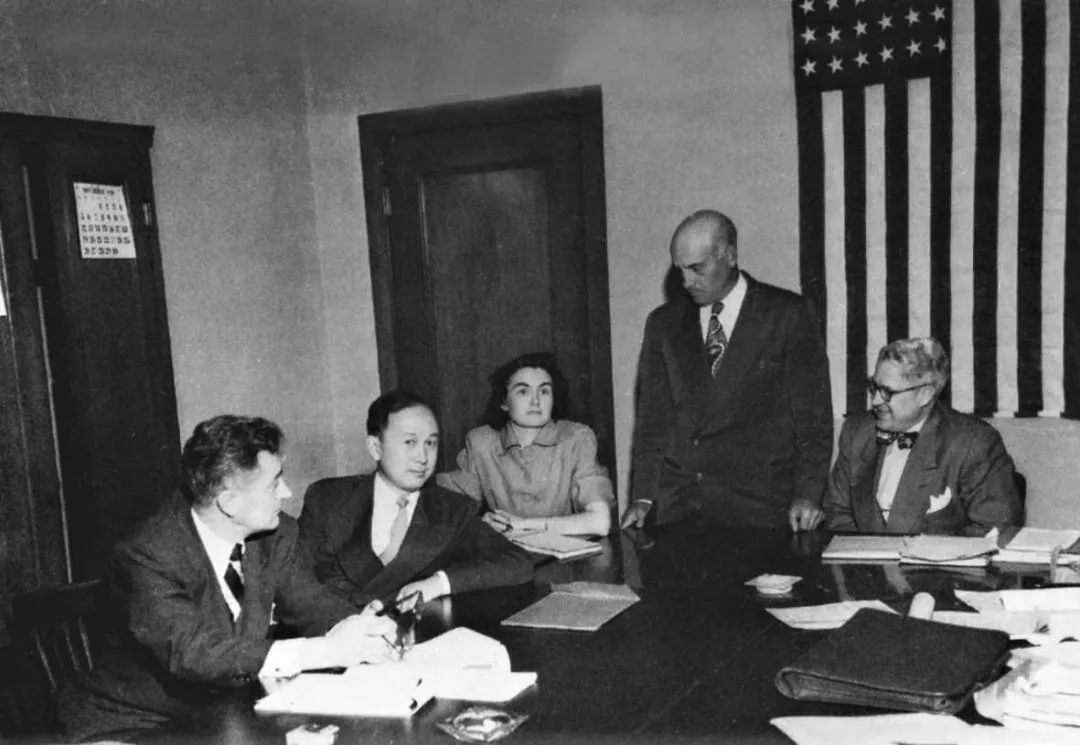
The 1950’s security hearing of Qian (second left). (Image source).
After losing his security clearance, Qian began to pack up, saying he wanted to visit his aging parents back home. Federal agents seized his luggage, which they claimed contained classified materials, and arrested him on suspicion of subversive activity. Although Qian denied any Communist leanings and rejected the accusation, he was detained by the government in California and spent the next five years under house arrest.
Five years later, in 1955, two years after the end of the Korean War, Qian was sent home to China as part of an apparent exchange for 11 American airmen who had been captured during the war. He told waiting reporters he “would never step foot in America again,” and he kept his promise (BBC 2020).
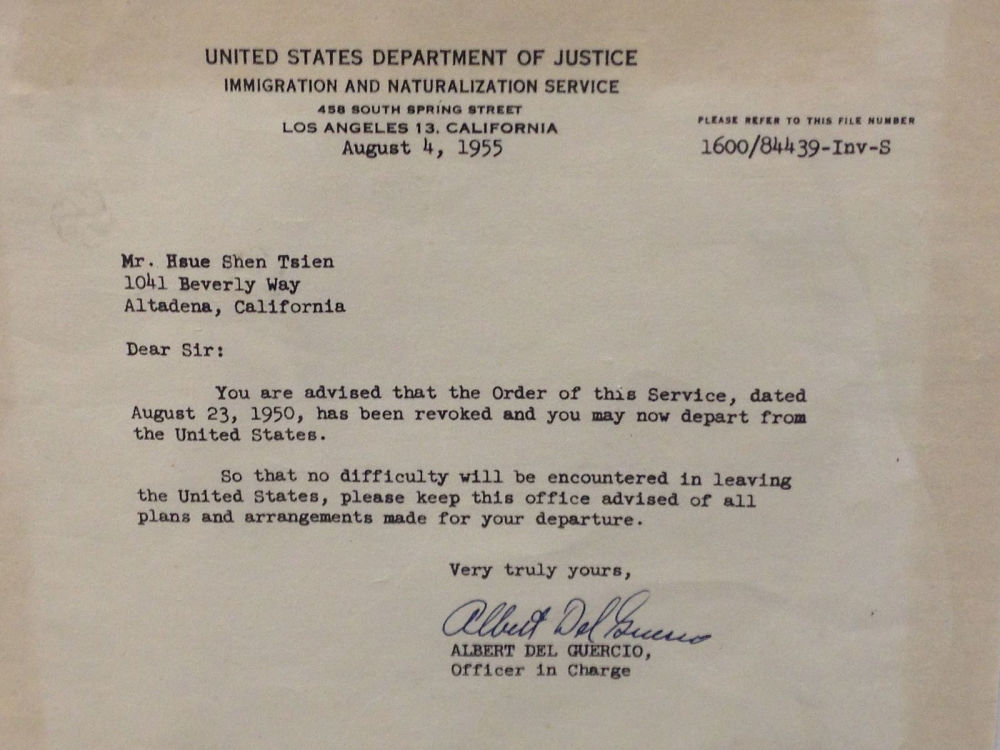
A letter from the US Immigration and Naturalization Service to Qian Xuesen, dated August 4, 1955, in which he was notified he was allowed to leave the US. The original copy is owned by Qian Xuesen Library of Shanghai Jiao Tong University, where the photo was taken. (Caption and image via wiki).
Dan Kimball, who was the Secretary of the US Navy at the time, expressed his regret about Qian’s departure, reportedly stating, “I’d rather shoot him dead than let him leave America. Wherever he goes, he equals five divisions.” He also stated: “It was the stupidest thing this country ever did. He was no more a communist than I was, and we forced him to go” (Perrett & Bradley, 2008).
Kimball may have foreseen the unfolding events accurately. After his return to China, Qian did indeed assume a pivotal role in enhancing China’s military capabilities, possibly surpassing the potency of five divisions. The missile programme that Qian helped develop in China resulted in weapons which were then fired back on America, including during the 1991 Gulf War (BBC 2020).
Returning: Becoming a National Hero
The China that Qian Xuesen had left behind was an entirely different China than the one he returned to. China, although having relatively few experts in the field, was embracing new possibilities and technologies related to rocketry and space exploration.
Within less than a month of his arrival, Qian was welcomed by the then Vice Prime Minister Chen Yi, and just four months later, he had the honor of meeting Chairman Mao himself.
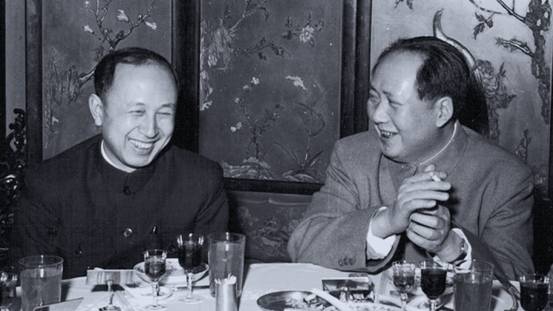
Qian and Mao (image source).
In China, Qian began a remarkably successful career in rocket science, with great support from the state. He not only assumed leadership but also earned the distinguished title of the “father” of the Chinese missile program, instrumental in equipping China with Dongfeng ballistic missiles, Silkworm anti-ship missiles, and Long March space rockets.
Additionally, his efforts laid the foundation for China’s contemporary surveillance system.
By now, Qian has become somewhat of a folk hero. His tale of returning to China despite being thwarted by the U.S. government has become like a legendary narrative in China: driven by unwavering patriotism, he willingly abandoned his overseas success, surmounted formidable challenges, and dedicated himself to his motherland.
Throughout his lifetime, Qian received numerous state medals in recognition of his work, establishing him as a nationally celebrated intellectual. From 1989 to 2001, the state-launched public movement “Learn from Qian Xuesen” was promoted throughout the country, and by 2001, when Qian turned 90, the national praise for him was on a similar level as that for Deng Xiaoping in the decade prior (Wang 2011).
Qian Xuesen remains a celebrated figure. On September 3rd of this year, a new “Qian Xuesen School” was established in Wenzhou, Zhejiang Province, becoming the sixth high school bearing the scientist’s name since the founding of the first one only a year ago.
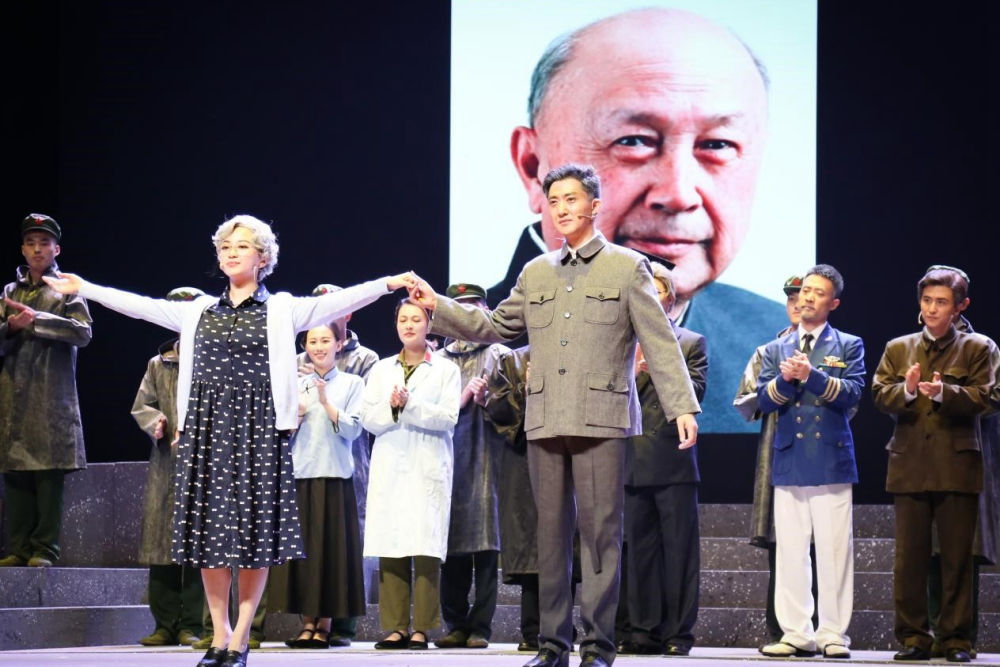
In 2017, the play “Qian Xuesen” was performed at Qian’s alma mater, Shanghai Jiaotong University. (Image source.)
Qian Xuesen’s legacy extends well beyond educational institutions. His name frequently appears in the media, including online articles, books, and other publications. There is the Qian Xuesen Library and a museum in Shanghai, containing over 70,000 artefacts related to him. Qian’s life story has also been the inspiration for a theater production and a 2012 movie titled Hsue-Shen Tsien (钱学森).2
Unanswered Questions
As is often the case when people are turned into heroes, some part of the stories are left behind while others are highlighted. This holds true for both Robert Oppenheimer and Qian Xuesen.
The Communist Party of China hailed Qian as a folk hero, aligning with their vision of a strong, patriotic nation. Many Chinese narratives avoid the debate over whether Qian’s return was linked to problems and accusations in the U.S., rather than genuine loyalty to his homeland.
In contrast, some international media have depicted Qian as a “political opportunist” who returned to China due to disillusionment with the U.S., also highlighting his criticism of “revisionist” colleagues during the Cultural Revolution and his denunciation of the 1989 student demonstrations.
Unlike the image of a resolute loyalist favored by the Chinese public, Qian’s political ideology was, in fact, not consistently aligned, and there were instances where he may have prioritized opportunity over loyalty at different stages of his life.
Qian also did not necessarily aspire to be a “flawless hero.” Upon returning to China, he declined all offers to have his biography written for him and refrained from sharing personal information with the media. Consequently, very little is known about his personal life, leaving many questions about the motivations driving him, and his true political inclinations.

The marriage photo of Qian and Jiang. (Image source).
We do know that Qian’s wife, Jiang Ying (蒋英), had a remarkable background. She was of Chinese-Japanese mixed race and was the daughter of a prominent military strategist associated with Chiang Kai-shek. Jiang Ying was also an accomplished opera singer and later became a professor of music and opera at the Central Conservatory of Music in Beijing.
Just as with Qian, there remain numerous unanswered questions surrounding Oppenheimer, including the extent of his communist sympathies and whether these sympathies indirectly assisted the Soviet Union during the Cold War.
Perhaps both scientists never imagined they would face these questions when they first decided to study physics. After all, they were scientists, not the heroes that some narratives portray them to be.
Also read:
■ Farewell to a Self-Taught Master: Remembering China’s Colorful, Bold, and Iconic Artist Huang Yongyu
■ “His Name Was Mao Anying”: Renewed Remembrance of Mao Zedong’s Son on Chinese Social Media
By Zilan Qian
Follow @whatsonweibo
1 Some sources claim that Qian was born in Hangzhou, while others say he was born in Shanghai with ancestral roots in Hangzhou.
2The Chinese character 钱 is typically romanized as “Qian” in Pinyin. However, “Tsien” is a romanization in Wu Chinese, which corresponds to the dialect spoken in the region where Qian Xuesen and his family have ancestral roots.
This article has been edited for clarity by Manya Koetse
References (other sources hyperlinked in text)
BBC. 2020. “Qian Xuesen: The man the US deported – who then helped China into space.” BBC.com, 27 October https://www.bbc.com/news/stories-54695598 [9.16.23].
Monk, Ray. 2013. Robert Oppenheimer: A Life inside the Center, First American Edition. New York: Doubleday.
Perrett, Bradley, and James R. Asker. 2008. “Person of the Year: Qian Xuesen.” Aviation Week and Space Technology 168 (1): 57-61.
Wang, Ning. 2011. “The Making of an Intellectual Hero: Chinese Narratives of Qian Xuesen.” The China Quarterly, 206, 352-371. doi:10.1017/S0305741011000300
Get the story behind the hashtag. Subscribe to What’s on Weibo here to receive our newsletter and get access to our latest articles:
Spotted a mistake or want to add something? Please let us know in comments below or email us. First-time commenters, please be patient – we will have to manually approve your comment before it appears.
©2023 Whatsonweibo. All rights reserved. Do not reproduce our content without permission – you can contact us at info@whatsonweibo.com.
Backgrounder
Farewell to a Self-Taught Master: Remembering China’s Colorful, Bold, and Iconic Artist Huang Yongyu
Renowned Chinese artist and the creator of the ‘Blue Rabbit’ zodiac stamp Huang Yongyu has passed away at the age of 98. “I’m not afraid to die. If I’m dead, you may tickle me and see if I smile.”
Published
1 year agoon
June 15, 2023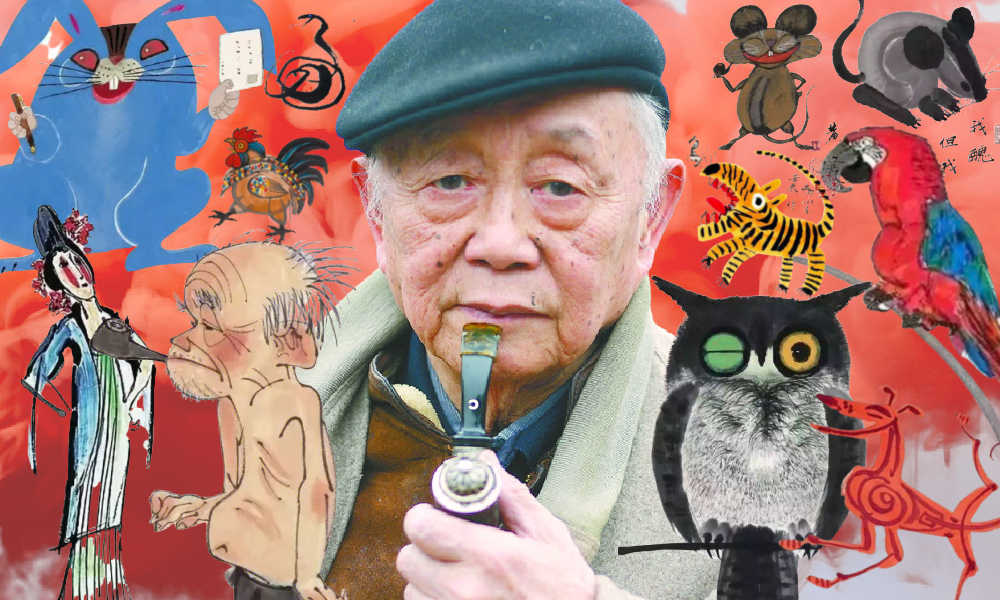
The famous Chinese painter, satirical poet, and cartoonist Huang Yongyu has passed away. Born in 1924, Huang endured war and hardship, yet never lost his zest for life. When his creativity was hindered and his work was suppressed during politically tumultuous times, he remained resilient and increased “the fun of living” by making his world more colorful.
He was a youthful optimist at old age, and will now be remembered as an immortal legend. The renowned Chinese painter and stamp designer Huang Yongyu (黄永玉) passed away on June 13 at the age of 98. His departure garnered significant attention on Chinese social media platforms this week.
On Weibo, the hashtag “Huang Yongyu Passed Away” (#黄永玉逝世#) received over 160 million views by Wednesday evening.
Huang was a member of the China National Academy of Painting (中国国家画院) as well as a Professor at the Central Academy of Fine Arts (中央美术学院).
Huang Yongyu is widely recognized in China for his notable contribution to stamp design, particularly for his iconic creation of the monkey stamp in 1980. Although he designed a second monkey stamp in 2016, the 1980 stamp holds significant historical importance as it marked the commencement of China Post’s annual tradition of releasing zodiac stamps, which have since become highly regarded and collectible items.
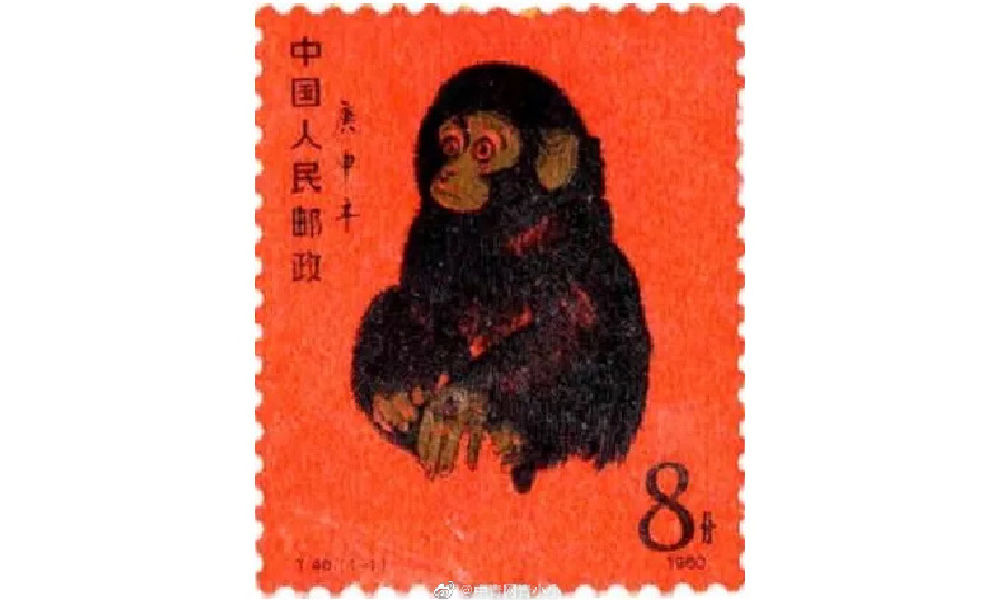
Huang’s famous money stamp that was issued by China Post in 1980.
The monkey stamp designed by Huang Yongyu has become a cherished collector’s item, even outside of China. On online marketplaces like eBay, individual stamps from this series are being sold for approximately $2000 these days.
Huang Yongyu’s latest most famous stamp was this year’s China Post zodiac stamp. The stamp, a blue rabbit with red eyes, caused some online commotion as many people thought it looked “horrific.”
Some thought the red-eyed blue rabbit looked like a rat. Others thought it looked “evil” or “monster-like.” There were also those who wondered if the blue rabbit looked so wild because it just caught Covid.
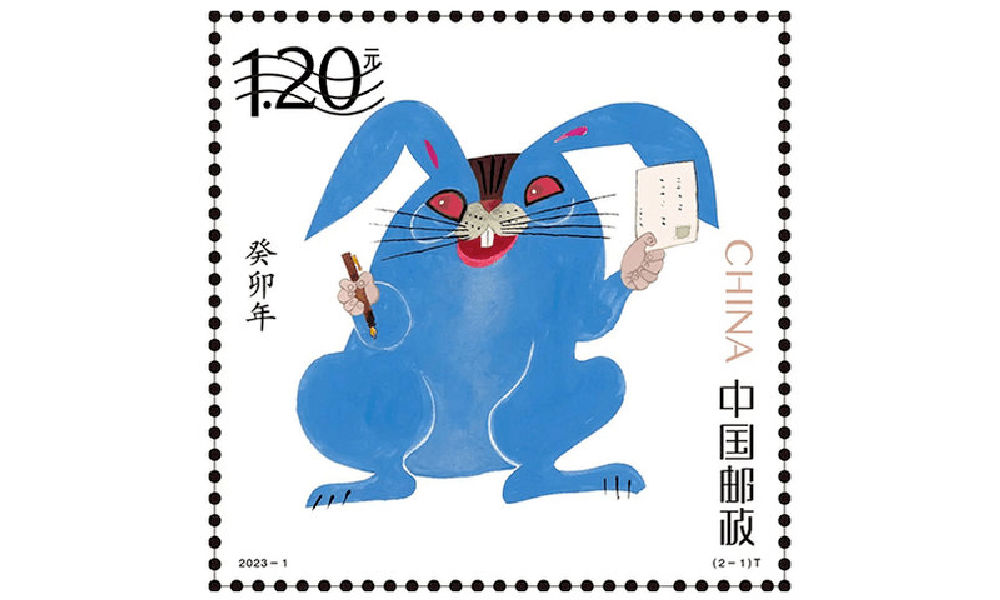
Huang’s (in)famous blue rabbit stamp.
Nevertheless, many people lined up at post offices for the stamps and they immediately sold out.
In light of the controversy, Huang Yongyu spoke about the stamps in a livestream in January of 2023. The 98-year-old artist claimed he had simply drawn the rabbit to spread joy and celebrate the new year, stating, “Painting a rabbit stamp is a happy thing. Everyone could draw my rabbit. It’s not like I’m the only one who can draw this.”
Huang’s response also went viral, with one Weibo hashtag dedicated to the topic receiving over 12 million views (#蓝兔邮票设计者直播回应争议#) at the time. Those defending Huang emphasized how it was precisely his playful, light, and unique approach to art that has made Huang’s work so famous.
A Self-Made Artist
“I’m ugly, but my mum likes me”
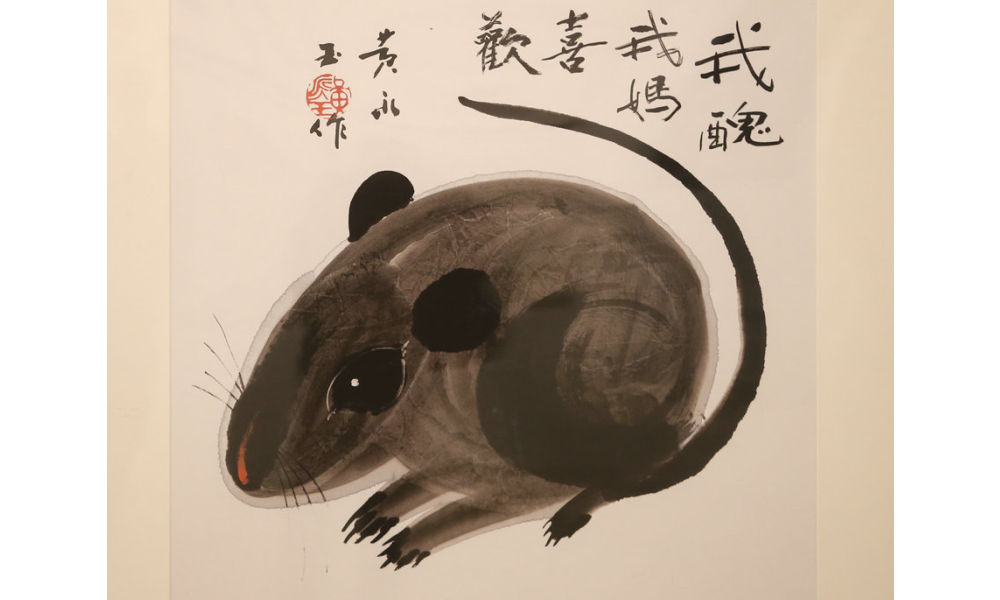
‘Ugly Mouse’ by Huang Yongyu [Image via China Daily].
Huang Yongyu was born on August 9, 1924, in Hunan’s Chengde as a native of the Tujia ethnic group.
He was born into an extraordinary family. His grandfather, Huang Jingming (黄镜铭), worked for Xiong Xiling (熊希齡), who would become the Premier of the Republic of China. His first cousin and lifelong friend was the famous Chinese novelist Shen Congwen (沈从文). Huang’s father studied music and art and was good at drawing and playing the accordion. His mother graduated from the Second Provincial Normal School and was the first woman in her county to cut her hair short and wear a short skirt (CCTV).
Born in times of unrest and poverty, Huang never went to college and was sent away to live with relatives at the age of 13. His father would die shortly after, depriving him of a final goodbye. Huang started working in various places and regions, from porcelain workshops in Dehua to artisans’ spaces in Quanzhou. At the age of 16, Huang was already earning a living as a painter and woodcutter, showcasing his talents and setting the foundation for his future artistic pursuits.
When he was 22, Huang married his first girlfriend Zhang Meixi (张梅溪), a general’s daughter, with whom he shared a love for animals. He confessed his love for her when they both found themselves in a bomb shelter after an air-raid alarm.
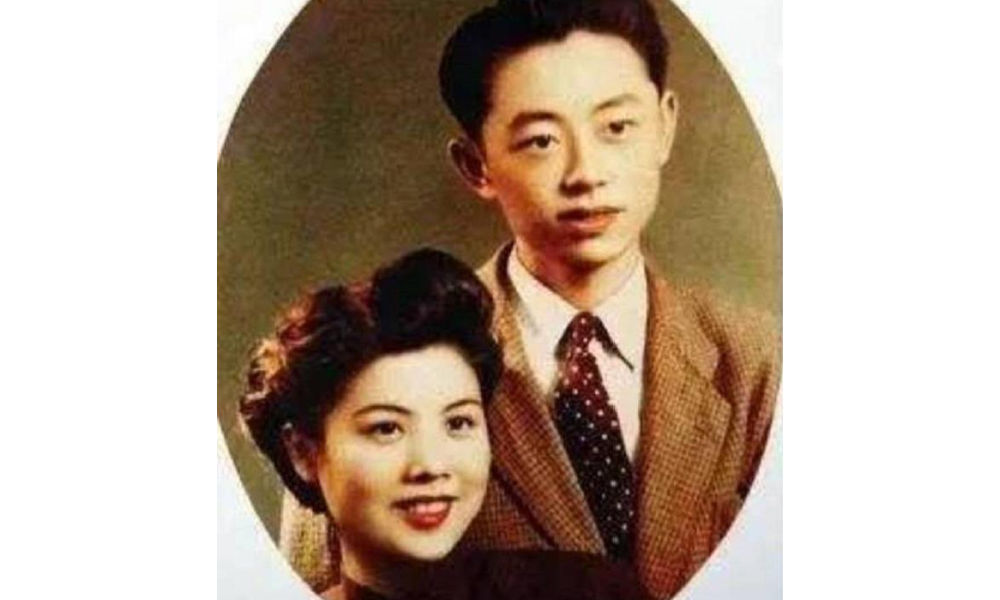
Huang and Zhang Meixi [163.com]
In his twenties, Huang Yongyu emerged as a sought-after artist in Hong Kong, where he had relocated in 1948 to evade persecution for his left-wing activities. Despite achieving success there, he heeded Shen Congwen’s advice in 1953 and moved to Beijing. Accompanied by his wife and their 7-month-old child, Huang took on a teaching position at the esteemed Central Academy of Fine Arts (中央美术学院).
The couple raised all kinds of animals at their Beijing home, from dogs and owls to turkeys and sika deers, and even monkeys and bears (Baike).
Throughout Huang’s career, animals played a significant role, not only reflecting his youthful spirit but also serving as vehicles for conveying satirical messages.
One recurring motif in his artwork was the incorporation of mice. In one of his famous works, a grey mouse is accompanied by the phrase ‘I’m ugly, but my mum likes me’ (‘我丑,但我妈喜欢’), reinforcing the notion that regardless of our outward appearance or circumstances, we remain beloved children in the eyes of our mothers.
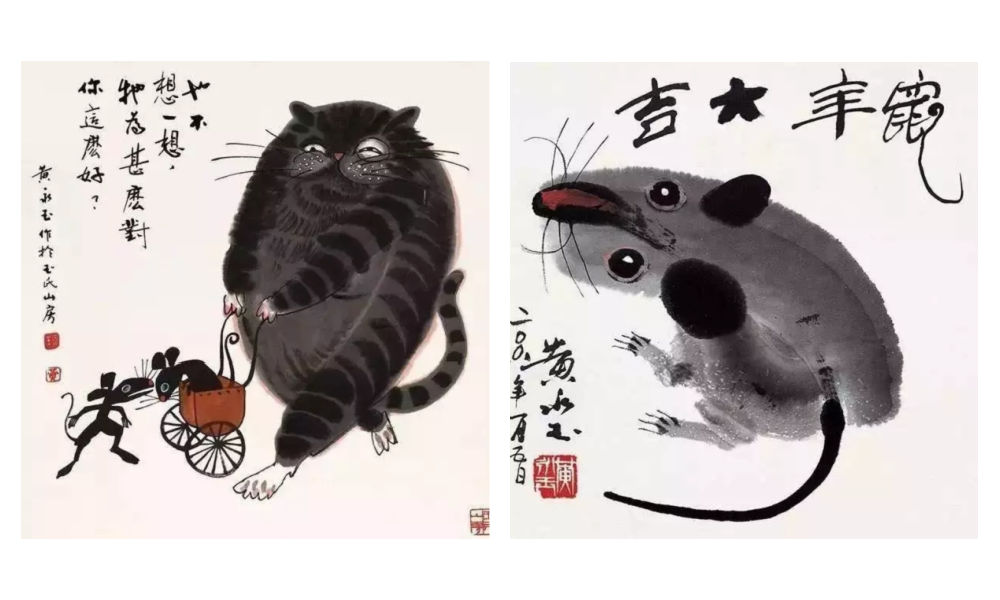
As a teacher, Huang liked to keep his lessons open-minded and he, who refused to join the Party himself, stressed the importance of art over politics. He would hold “no shirt parties” in which his all-male studio students would paint in an atmosphere of openness and camaraderie during hot summer nights (Andrews 1994, 221; Hawks 2017, 99).
By 1962, creativity in the classroom was limited and there were far more restrictions to what could and could not be created, said, and taught.
Bright Colors in Dark Times
“Strengthen my resolve and increase the fun of living”
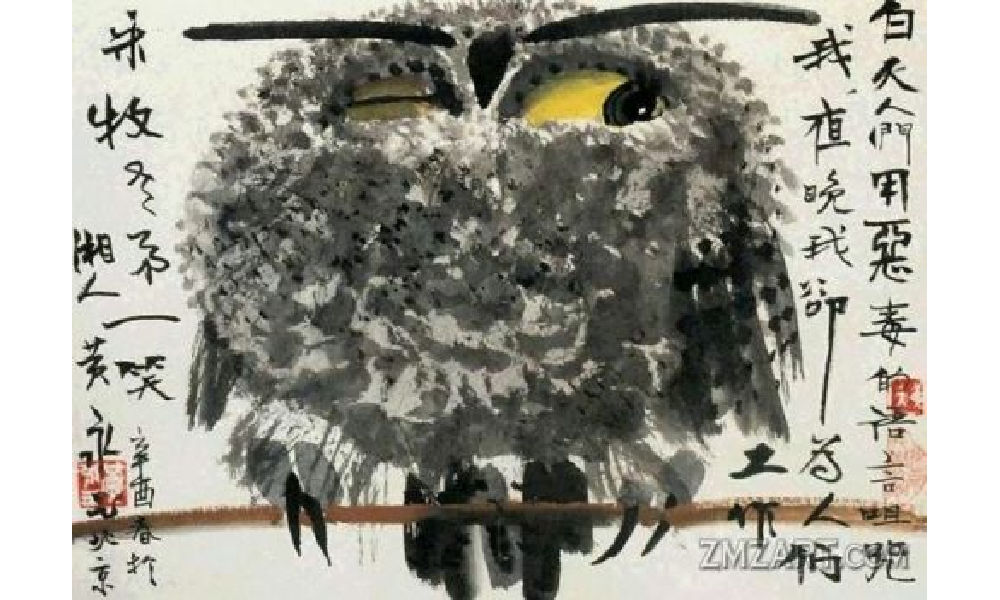
Huang Yongyu’s winking owl, 1973, via Wikiart.
In 1963, Huang was sent to the countryside as part of the “Four Cleanups” movement (四清运动, 1963-1966). Although Huang cooperated with the requirement to attend political meetings and do farm work, he distanced himself from attempts to reform his thinking. In his own time, and even during political meetings, he would continue to compose satirical and humorous pictures and captions centered around animals, which would later turn into his ‘A Can of Worms’ series (Hawks 2017, 99; see Morningsun.org).
Three years later, at the beginning of the Cultural Revolution, many Chinese major artists, including Huang, were detained in makeshift jails called ‘niupeng‘ (牛棚), cowsheds. Huang’s work was declared to be counter-revolutionary, and he was denounced and severely beaten. Despite the difficult circumstances, Huang’s humor and kindness would remind his fellow artist prisoners of the joy of daily living (2017, 95-96).
After his release, Huang and his family were relocated to a cramped room on the outskirts of Beijing. The authorities, thinking they could thwart his artistic pursuits, provided him with a shed that had only one window, which faced a neighbor’s wall. However, this limitation didn’t deter Huang. Instead, he ingeniously utilized vibrant pigments that shone brightly even in the dimly lit space.
During this time, he also decided to make himself an “extra window” by creating an oil painting titled “Eternal Window” (永远的窗户). Huang later explained that the flower blossoms in the paining were also intended to “strengthen my resolve and increase the fun of living” (Hawks 2017, 4; 100-101).
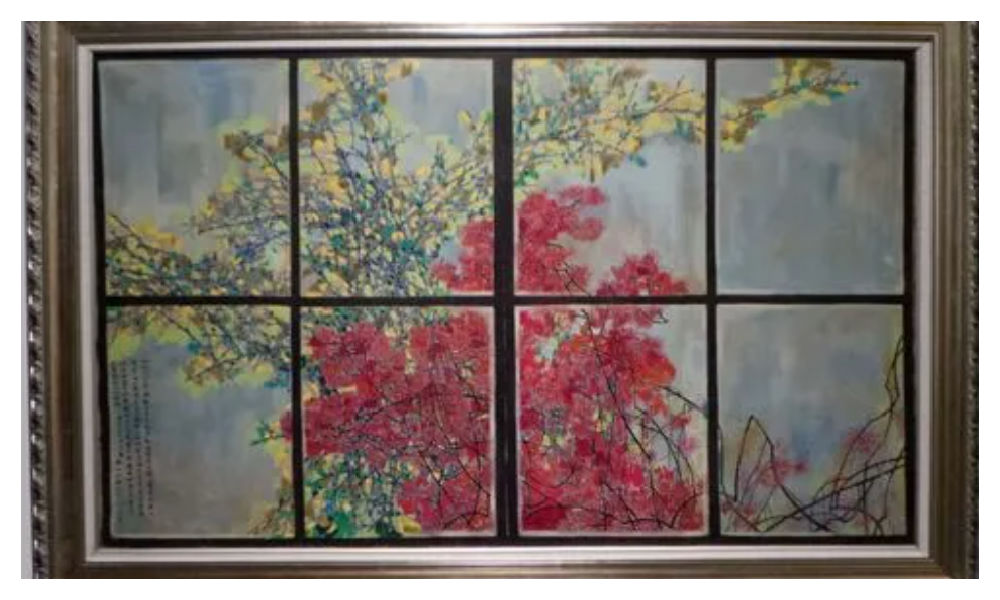
Huang Yongyu’s Eternal Window [Baidu].
In 1973, during the peak of the Cultural Revolution, Huang painted his famous winking owl. The calligraphy next to the owl reads: “During the day people curse me with vile words, but at night I work for them” (“白天人们用恶毒的语言诅咒我,夜晚我为他们工作”) (Matthysen 2021, 165).
The painting was seen as a display of animosity towards the regime, and Huang got in trouble for it. Later on in his career, however, Huang would continue to paint owls. In 1977, when the Cultural Revolution had ended, Huang Yongyu painted other owls to ridicules his former critics (2021, 174).
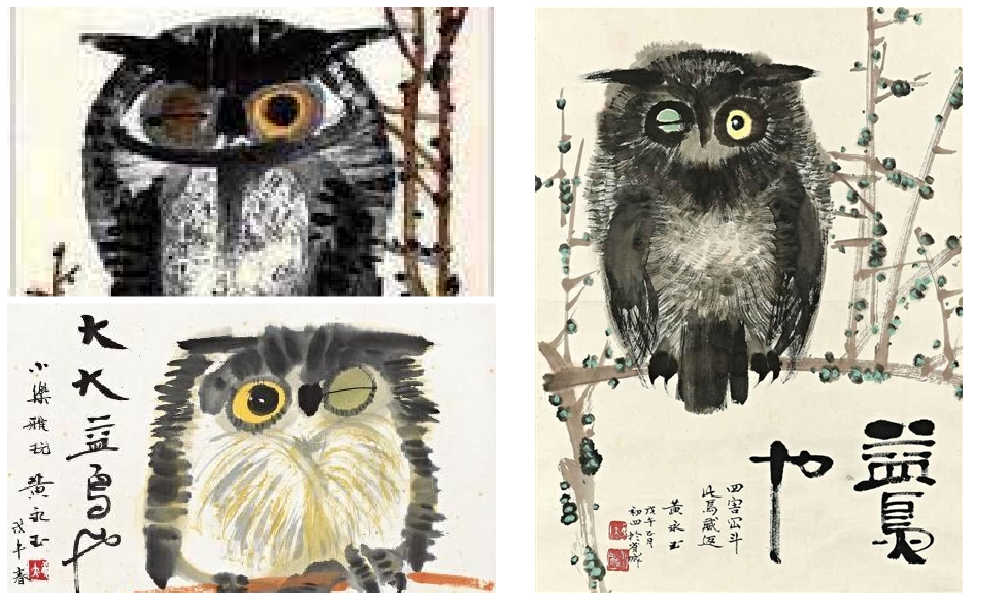
According to art scholar Shelly Drake Hawks, Huang Yongyu employed animals in his artwork to satirize the realities of life under socialism. This approach can be loosely compared to George Orwell’s famous novel Animal Farm.
However, Huang’s artistic style, vibrant personal life, and boundary-pushing work ethic also draw parallels to Picasso. Like Picasso, Huang embraced a colorful life, adopted an innovative approach to art, and challenged artistic norms.
An Optimist Despite All Hardships
“Quickly come praise me, while I’m still alive”
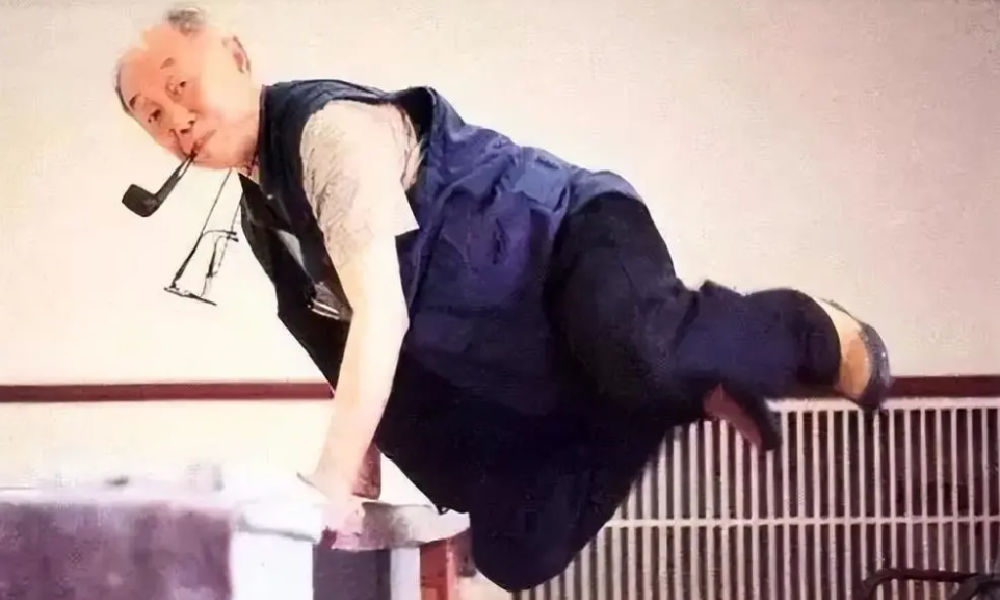
Huang Yongyu will be remembered in China with love and affection for numerous reasons. Whether it is his distinctive artwork, his mischievous smile and trademark pipe, his unwavering determination to follow his own path despite the authorities’ expectations, or his enduring love for his wife of over 75 years, there are countless aspects to appreciate and admire about Huang.
One things that is certainly admirable is how he was able to maintain a youthful and joyful attitude after suffering many hardships and losing so many friends.
“An intriguing soul. Too wonderful to describe,” one Weibo commenter wrote about Huang, sharing pictures of Huang Yongyu’s “Scenes of Pooping” (出恭图) work.
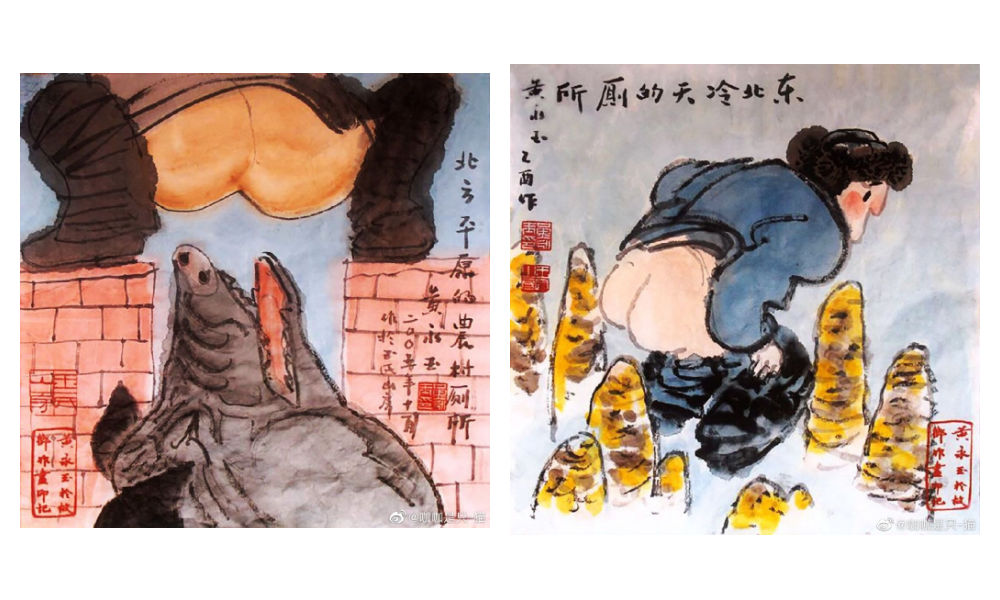
Old age did not hold him back. At the age of 70, his paintings sold for millions. When he was in his eighties, he was featured on the cover of Esquire (时尚先生) magazine.
At the age of 82, he stirred controversy in Hong Kong with his “Adam and Eve” sculpture featuring male and female genitalia, leading to complaints from some viewers. When confronted with the backlash, Huang answered, “I just wanted to have a taste of being sued, and see how the government would react” (Ora Ora).
I'm guessing the 98-year-old Huang loved the controversy. When confronted with backlash for his sculpture featuring male and female genitalia in 2007 Hong Kong, Huang answered, "I just wanted to have a taste of being sued, and see how the government would react." pic.twitter.com/kG0MVVM4SN
— Manya Koetse (@manyapan) June 15, 2023
In his nineties, he started driving a Ferrari. He owned mansions in his hometown in Hunan, in Beijing, in Hong Kong, and in Italy – all designed by himself (Chen 2019).
Huang kept working and creating until the end of his life. “It’s good to work diligently. Your work may be meaningful. Maybe it won’t be. Don’t insist on life being particularly meaningful. If it’s happy and interesting, then that’s great enough.”
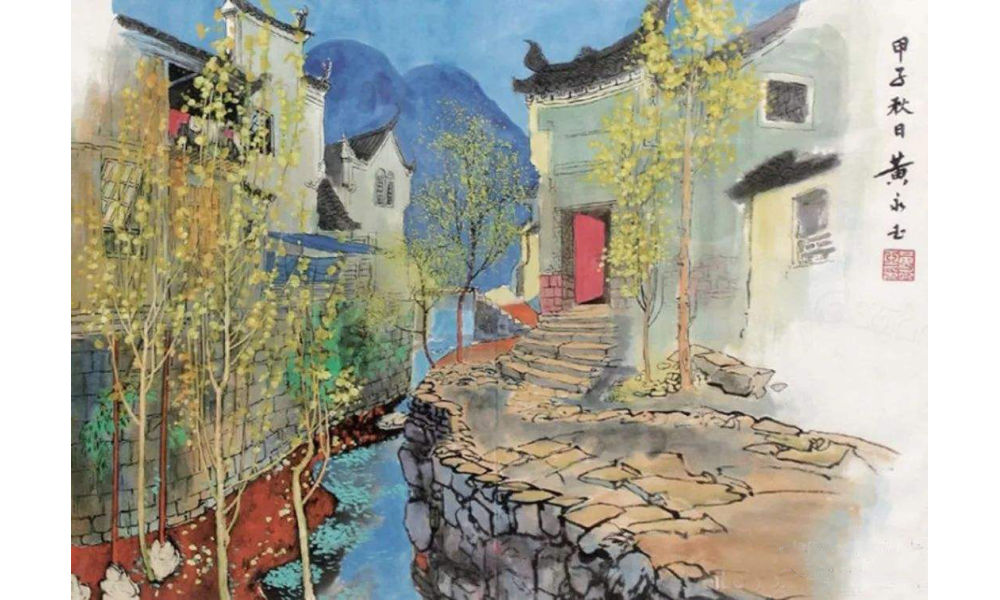
“Hometown Scenery” or rather “Hunan Scenery” (湘西风景) by Huang.
Huang did not dread the end of his life.
“My old friends have all died, I’m the only one left,” he said at the age of 95. He wrote his will early and decided he wanted a memorial service for himself before his final departure. “Quickly come praise me, while I’m still alive,” he said, envisioning himself reclining on a chair in the center of the room, “listening to how everyone applauds me” (CCTV, Sohu).
He stated: “I don’t fear death at all. I always joke that when I die, you should tickle me first and see if I’ll smile” (“对死我是一点也不畏惧,我开玩笑,我等死了之后先胳肢我一下,看我笑不笑”).

Huang with Yiwo (伊喔), the original model for the monkey stamp [Shanghai Observer].
Huang also was not sentimental about what should happen to his ashes. In a 2019 article in Guangming Daily, it was revealed that he suggested to his wife the idea of pouring his ashes into the toilet and flushing them away with the water.
However, his wife playfully retorted, saying, “No, that won’t do. Your life has been too challenging; you would clog the toilet.”
To this, Huang responded, “Then wrap my ashes into dumplings and let everyone [at the funeral] eat them, so you can tell them, ‘You’ve consumed Huang Yongyu’s ashes!'”
But she also opposed of that idea, saying that they would vomit and curse him forever.
Nevertheless, his wife expressed opposition to this idea, citing concerns that it would cause people to vomit and curse him indefinitely.
In response, Huang declared, “Then let’s forget about my ashes. If you miss me after I’m gone, just look up at the sky and the clouds.” Eventually, his wife would pass away before him, in 2020, at the age of 98, having spent 77 years together with Huang.
Huang will surely be missed. Not just by the loved ones he leaves behind, but also by millions of his fans and admirers in China and beyond.
“We will cherish your memory, Mr. Huang,” one Weibo blogger wrote. Others honor Huang by sharing some of his famous quotes, such as, “Sincerity is more important than skill, which is why birds will always sing better than humans” (“真挚比技巧重要,所以鸟总比人唱得好”).
Among thousands of other comments, another social media user bid farewell to Huang Yongyu: “Our fascinating Master has transcended. He is now a fascinating soul. We will fondly remember you.”
By Manya Koetse
Get the story behind the hashtag. Subscribe to What’s on Weibo here to receive our newsletter and get access to our latest articles:
References
Andrews, Julia Frances. 1994. Painters and Politics in the People’s Republic of China, 1949-1979. Berkley: University of California Press.
Baike. “Huang Yongyu 黄永玉.” Baidu Baike https://baike.baidu.com/item/%E9%BB%84%E6%B0%B8%E7%8E%89/1501951 [June 14, 2023].
CCTV. 2023. “Why Everyone Loves Huang Yongyu [为什么人人都爱黄永玉].” WeChat 央视网 June 14.
Chen Hongbiao 陈洪标. 2019. “Most Spicy Artist: Featured in a Magazine at 80, Flirting with Lin Qingxia at 91, Playing with Cars at 95, Wants Memorial Service While Still Alive [最骚画家:80岁上杂志,91岁撩林青霞,95岁玩车,活着想开追悼会].” Sohu/Guangming Daily March 16: https://www.sohu.com/a/301686701_819105 [June 15, 2023].
Hawks, Shelley Drake. 2017. The Art of Resistance Painting by Candlelight in Mao’s China. Seattle: University of Washington Press.
Matthysen, Mieke. 2021. Ignorance is Bliss: The Chinese Art of Not Knowing. Palgrave Macmillan.
Ora Ora. “HUANG YONGYU 黃永玉.” Ora Ora https://www.ora-ora.com/artists/103-huang-yongyu/ [June 15, 2023].
Spotted a mistake or want to add something? Please let us know in comments below or email us. First-time commenters, please be patient – we will have to manually approve your comment before it appears.
©2023 Whatsonweibo. All rights reserved. Do not reproduce our content without permission – you can contact us at info@whatsonweibo.com.
Subscribe

Weibo Watch: The Future is Here

“Bye Bye Biden”: Biden’s Many Nicknames in Chinese

Enjoying the ‘Sea’ in Beijing’s Ditan Park

A Triumph for “Comrade Trump”: Chinese Social Media Reactions to Trump Rally Shooting

Weibo Watch: Get Up, Stand Up

The Tragic Story of “Fat Cat”: How a Chinese Gamer’s Suicide Went Viral

“Old Bull Eating Young Grass”: 86-Year-Old Chinese Painter Fan Zeng Marries 36-Year-Old Xu Meng

A Brew of Controversy: Lu Xun and LELECHA’s ‘Smoky’ Oolong Tea

Singing Competition or Patriotic Fight? Hunan TV’s ‘Singer 2024’ Stirs Nationalistic Sentiments

Zara Dress Goes Viral in China for Resemblance to Haidilao Apron

Weibo Watch: The Battle for the Bottom Bed

About the “AI Chatbot Based on Xi Jinping” Story

China’s Intensified Social Media Propaganda: “Taiwan Must Return to Motherland”

Weibo Watch: Telling China’s Stories Wrong

Saying Goodbye to “Uncle Wang”: Wang Wenbin Becomes Chinese Ambassador to Cambodia
Get in touch
Would you like to become a contributor, or do you have any tips or suggestions? Get in touch here!
Popular Reads
-

 China Insight3 months ago
China Insight3 months agoThe Tragic Story of “Fat Cat”: How a Chinese Gamer’s Suicide Went Viral
-

 China Music4 months ago
China Music4 months agoThe Chinese Viral TikTok Song Explained (No, It’s Not About Samsung)
-

 China Digital10 months ago
China Digital10 months agoToo Sexy for Weibo? Online Discussions on the Concept of ‘Cābiān’
-

 China Arts & Entertainment12 months ago
China Arts & Entertainment12 months agoBehind 8 Billion Streams: Who is Dao Lang Cursing in the Chinese Hit Song ‘Luocha Kingdom’?





carlos
April 16, 2018 at 8:46 pm
BUY/OBTAIN/MODIFY/PURCHASE IELTS,TOEFL CERTIFICATE:registeredielts2017@gmail.com
Buy IELTS Karachi, buy IELTS Pakistan, Get IELTS UAE, buy IELTS UK, Obtain IELTS certificate, buy IELTS degree, buy IELTS eBook, buy IELTS exam, buy IELTS, buy IELTS in Dubai, buy IELTS material online , buy IELTS practice test online, purchase IELTS, Order IELTS India, buy IELTS score, buy IELTS Mumbai, apply for IELTS, buy IELTS band 7, buy IELTS test, buy IELTS certificate, Take IELTS Syria, buy IELTS test online, buy IELTS test papers, buy IELTS band 8, buy certificate, buy road to IELTS, registered IELTS, Cambridge IELTS 9, buy online Cambridge IELTS, can buy IELTS certificate, can I buy IELTS, where can I buy IELTS, where can Get IELTS, where can I buy IELTS Singapore, buy IELTS Indonesia, band 7 Indonesia, where can I buy IELTS Toronto, where can I buy IELTS certificate, where can apply IELTS, where can I obtain IELTS, where to buy IELTS Delhi, where to buy IELTS in Dubai, where to buy IELTS Egypt, where to buy IELTS where to buy IELTS in Malaysia, where to buy IELTS Singapore , where to buy IELTS Vietnam,buy ielts academic, buy ielts general, ielts book online, registered ielts, ielts, ielts certificate pakistan, buy real nebosh qatar, buy original nebosh certificate without exams, buy real toelf certificate,
We offer our exclusive clients the ability to gain IELTS,TOEFL certificates
without taking the exams. The regions we cover are Asia ,UAE, Qatar,
Oman, Saudi Arabia, Jordan,Kuwait ,Australia ,Canada and Europe.Gain a chance to get genuine IELTS,TOEFL,Certificates. For more enquiry, send an email at:registeredielts2017@gmail.com
We work with the Cambridge Language assessment board. We work with database technicians who are responsible for Test report verification and registration of all IELTS results and with our help, you have guaranteed entry of your information into the respective database (IDP/BC) with valid test results to proof without any problem. The IELTS/Toefl Certificates we issue are legit and verifiable and valid for two years. Our IELTS/Toefl Certificates serve migration processing and also in obtaining Permanent Residence.
buy original/registered IELTS/TOEFL certificates in Yemen,
Buy orginal PTE Certificate Without Exam in United Arab Emirates,
buy original/registered IELTS/TOEFL certificates in Dubai,
buy original/registeredIELTS/TOEFL certificates in Turkey,
buy original/registered IELTS/TOEFL certificates in Qatar,
buy original/registered IELTS/TOEFL certificates in Israel,
buy original/registered IELTS/TOEFL certificates in Oman,
buy original/registered IELTS/TOEFL certificates in Kuwait,
buy original/registered IELTS/TOEFL certificates in Qatar,
buy original/registered IELTS/TOEFL certificates in Syria,
buy original/registered IELTS/TOEFL certificates in ISREAL,
buy original/registered IELTS/TOEFL certificates in Indonesia,
buy original/registered IELTS/TOEFL certificates in Lebanon,
buy original/registered IELTS/TOEFL certificates in yemen,
buy original/registered IELTS/TOEFL certificates in Jordan,
buy original/registered IELTS/TOEFL certificates in Palestine,
buy original/registered IELTS/TOEFL certificates in Pakistan,
buy original/registered IELTS/TOEFL certificates in Jordan,
buy original/registered IELTS/TOEFL certificates in australia,
buy original and registered ielts and toefl certificates in Poland,
buy original and registered ielts and toefl certificates in Ukraine,
buy original and registered ielts and toefl certificates in Greece,
buy original and registered ielts and toefl certificates in Austria,
buy original and registered ielts and toefl certificates in Sweden,
buy original and registered ielts and toefl certificates in Norway,
buy original and registered ielts and toefl certificates in Iceland,
buy original and registered ielts and toefl certificates in Finland,
buy original and registered ielts and toefl certificates in Croatia,
buy original and registered ielts and toefl certificates in Cyprus,
buy original and registered ielts and toefl certificates in Romania,
buy original and registered ielts and toefl certificates in Hungary,
buy original and registered ielts and toefl certificates in Bulgaria,
buy original and registered ielts and toefl certificates in Denmark,
buy original and registered ielts and toefl certificates in Slovenia,
buy original and registered ielts and toefl certificates in Serbia,
buy original and registered ielts and toefl certificates in Albania,
buy original and registered ielts and toefl certificates in Indonesia,
buy original and registered ielts and toefl certificates in Belarus,
buy original and registered ielts and toefl certificates in Slovakia,
buy original and registered ielts and toefl certificates in Bosnia,
buy original and registered ielts and toefl certificates in Estonia,
buy original and registered ielts and toefl certificates in Montenegro,
buy original and registered ielts and toefl certificates in Italy,
buy original and registered ielts and toefl certificates in Spain,
buy original and registered ielts and toefl certificates in Germany,
buy original and registered ielts and toefl certificates in Switzerland,
buy original and registered ielts and toefl certificates in Netherlands
buy original and registered ielts and toefl certificates in Czech Republic,
buy original/registered IELTS/TOEFL/ certificates in Saudi Arabia,
buy original/registered IELTS/TOEFL/ certificates in the middle East,
====================================
Apply for an IELTS without exams test|Apply for australia without IELTS without exams| Apply for Australian student visa without IELTS without exams|Apply for IELTS without exams|Apply for IELTS without exams 2018|Apply for IELTS without exams academic|Apply for IELTS without exams Australia|Apply for IELTS without exams Bahrain|Apply for IELTS without exams British council|Apply for IELTS without exams Canada|Apply for IELTS without exams dubai|Apply for IELTS without exams exam| Apply for IELTS without exams 2018|Apply for IELTS without exams exam Azerbaijan|Apply for IELTS without exams exam British council|Apply for IELTS without exams exam idp|Apply for IELTS without exams exam in Bahrain| Apply for IELTS without exams exam in Georgia|Apply for IELTS without exams exam in Jeddah|Apply for IELTS without exams exam in Jordan|Apply for IELTS without exams exam in Lebanon|Apply for IELTS without exams exam in UK |Apply for IELTS without exams exam India|Apply for IELTS without exams exam online|Apply for IELTS without exams exam online in Libya|Apply for IELTS without exams IDP|Apply for IELTS without exams in Abu Dhabi| Apply for IELTS without exams in Azerbaijan|Apply for IELTS without exams in dubai| Apply for IELTS without exams in kuwait|Apply for IELTS without exams in lahore|Apply for IELTS without exams in London|Apply for IELTS without exams in Pakistan|Apply for IELTS without exams in Qatar|Apply for IELTS without exams in Uzbekistan|Apply for IELTS without exams India|Apply for IELTS without exams Kuwait|Apply for IELTS without exams lebanon|Apply for IELTS without exams Melbourne|Apply for IELTS without exams online|Apply for IELTS without exams online in Australia|Apply for IELTS without exams online in Qatar|Apply for IELTS without exams paper|Apply for IELTS without exams Saudi Arabia|Apply for IELTS without exams scholarship|Apply for IELTS without exams scholarship|Apply for IELTS without exams test|Apply for IELTS without exams test Bahrain|Apply for IELTS without exams test idp|Apply for IELTS without exams test in india|Apply for IELTS without exams test in london|Apply for IELTS without exams test in melbourne|Apply for IELTS without exams test in riyadh|Apply for IELTS without exams test in sydney| Apply for IELTS without exams test online| Apply for IELTS without exams test online in India| Apply for IELTS without exams test online in london|
Genrl-surp: (registeredielts2017@gmail.com)
email: (registeredielts2017@gmail.com)